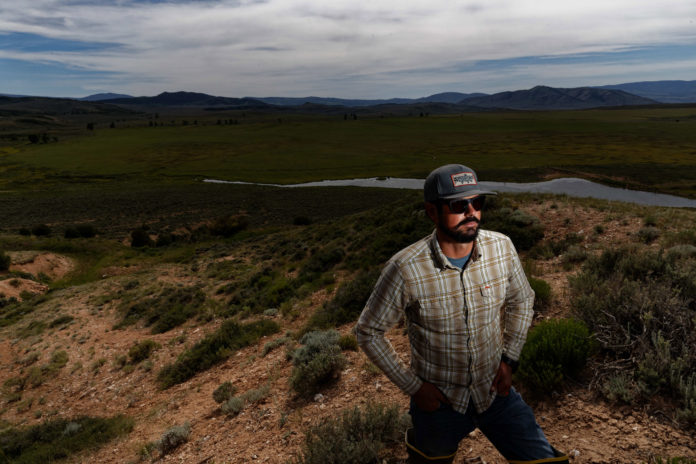Family ranching operations have been disappearing from the Colorado landscape for decades, victims of the compounding trends of high land prices, low cattle prices and fierce international competition. But for Bruchez’s generation, all of those challenges pale before the biggest threat to their way of life: dwindling access to water. The river flows that once irrigated the dry West and fed its cities are increasingly strained by suburban development and reduced by the vagaries of climate change.
Technically, families like Bruchez’s have the upper hand in water disputes. The whole Western water system is built on a roughly 150-year-old legal regime that gives priority access to whoever put the water to use first. Farmers and ranchers led the settlement of the West, giving them the most “senior” rights and ensuring that they get their water before newer users like sprawling suburbs. Some 70 percent of the Colorado River’s flow is consumed by agriculture.
But as climate change keeps squeezing the water supply, the ranchers’ position is growing more precarious. They are far less powerful and wealthy than the cities that need water, which have often swooped in and bought out farms for their water rights. It is inevitable, now, that large amounts of water will have to leave agriculture in order to sustain cities and suburbs in the far-drier future; the question is simply whether it can be done in a way that keeps agriculture on the landscape.
Over the past century, Denver, Boulder and other cities on Colorado’s dry Front Range have steadily bought up farmers’ water rights on the wet, western slope of the Rockies and built massive, transmountain tunnels to ship the water to thirsty city dwellers. Today, roughly 65 percent of the water that would naturally flow into Grand County, where Kremmling sits, is diverted elsewhere. Many farm and ranch families nurse a grudge to this day, holding tight to the old Mark Twain adage that “whiskey is for drinking; water is for fighting.”
But Bruchez’s twin near-disasters and his path to recovering from them led him to a different conclusion: that in the long term, financial and climatic forces are aligned against agriculture, and ranchers and farmers are likely to lose if they don’t find a way to make themselves part of the solution.
Instead of seeing agriculture and new suburbanites as locked in a zero-sum struggle over who gets the West’s diminishing water, Bruchez has spent the past two decades hatching a series of projects to help ranchers by making common cause with sportsmen, environmental groups and even some big city water officials and lawyers.
Now, Bruchez has emerged as a leading voice for agriculture in Colorado as the state explores a controversial new scheme to manage its own, internal water usage—almost certainly by paying farmers to forgo using their water—in a bid to avoid a nightmare scenario in which river flows dip so low that the terms of a 1922 river compact force junior users like cities to be abruptly cut off. It’s an idea that has been knocking around water policy circles across the West for years without action, but that could be called into place quickly if the river’s flows continue to shrink rapidly.
Bruchez, 39, is as comfortable on a Zoom conference call with state water managers as he is riding horseback with a neighbor to steer cattle away from a quickly spreading forest fire, and in between he steals quiet moments to cast a line into the nearby river, in search of a rainbow or brown trout. What drives him is not just a desire to protect his family’s way of life, but to prove that farmers and ranchers aren’t just part of a mythical Western past but can be a part of the solution to weathering climate change and preserving the environment for the future.
Indeed, Bruchez says, ranchers know that cities and environmentalists eye their water rights greedily, and some of them question whether such a precious resource should be used at all to support livestock and crops. Bruchez and other ranchers increasingly recognize that they will survive only if they can find a way to negotiate with interests they’ve traditionally seen as the enemy.
“Water is our lifeblood in agriculture, but water is our lifeblood of the entire Southwest,” said Bruchez. “With agriculture using most of the water, I think it’s our job to be part of the solution. It is all of our future.”
Efforts to confront the high-stakes water challenges in the West are emerging as a test for the problem the whole country will soon face as the effects of climate change take hold: How American politics and laws can be renegotiated to share a landscape that no longer offers the limitless resources its original occupants thought they would enjoy. And Bruchez is offering a new way to think about it, from the ground up. If there’s a solution to divvying up the Colorado River that can work for both the booming Denver suburbs and the ranchers who endow the region with its character and politics, it won’t be a top-down edict from Washington. It will need to come from compromises and new schemes for the water hashed out by the people who use it.
At the heart of Bruchez’s work is the belief that the only lasting solutions for the river are ones that work for every person—and creature—who relies on it. One set of interests can’t be served at the expense of another. It’s a shift in thinking that has slowly taken root among the major players on the Colorado River over the past two decades, and one that the incoming Biden administration is showing signs it will embrace. But translating that philosophy to on-the-ground practice has never before been tested at scale.
In that light, the work underway in Colorado is an important test of whether competing interests can make cooperation, shared sacrifice and environmental restoration economically viable on a river that supports 40 million people—or if they will retreat to their corners and risk letting the entire system fall into political and economic chaos.
Credit: Source link































